Setting healthy boundaries in relationships after addiction
August 1, 2025
The Power of Boundaries in Healing and Recovery

Understanding the Foundation of Healthy Relationships Post-Addiction
Navigating the path to recovery involves more than just abstaining from substances; it requires establishing clear, respectful boundaries that support emotional well-being, promote accountability, and foster healthier relationships. This article explores the essential role of boundaries after addiction, including strategies to set, maintain, and reinforce them across different relationship contexts, ensuring a sustainable journey toward healing.
The Crucial Role of Boundaries in Recovery
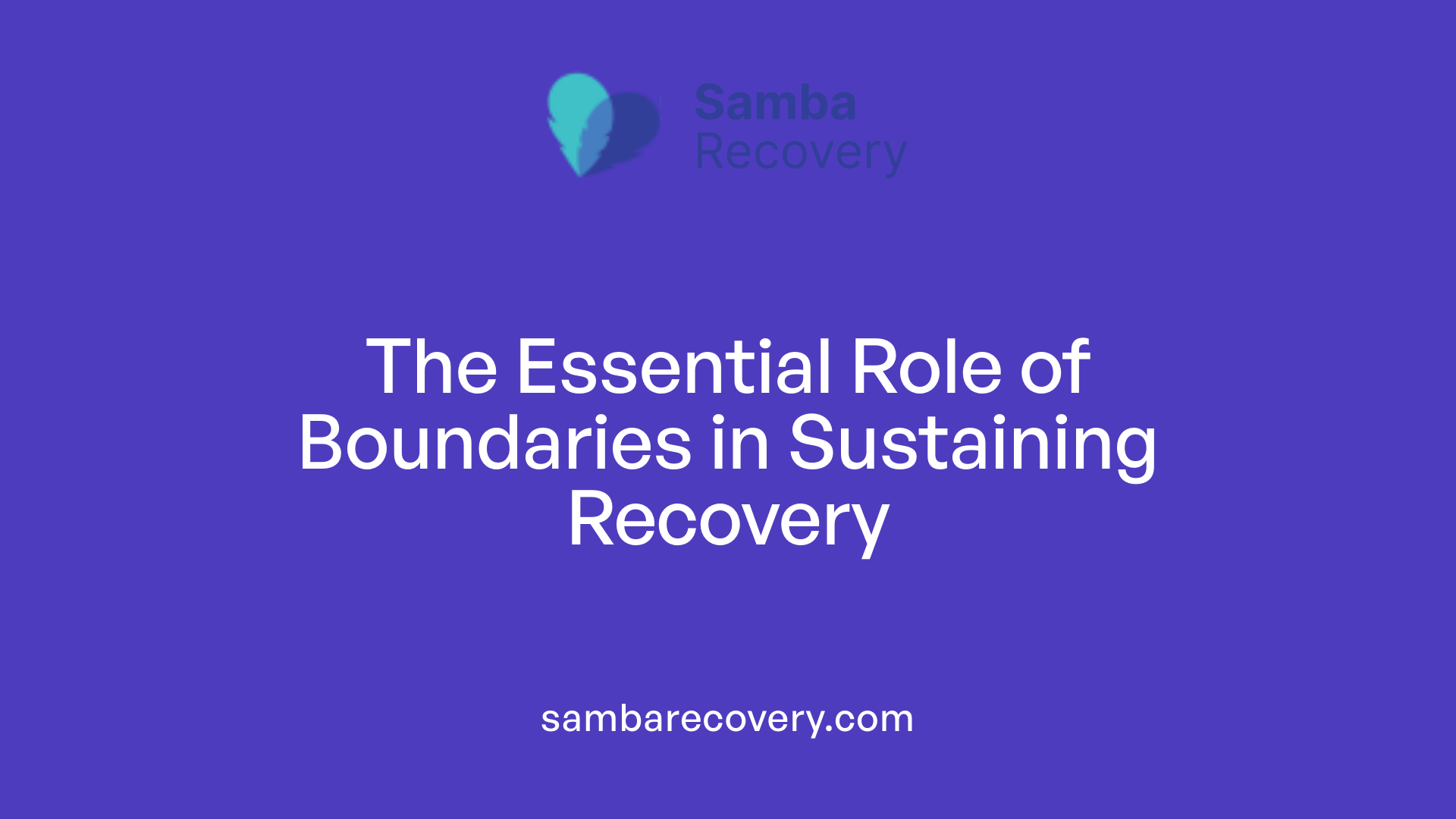
Boundaries as protection during recovery
Establishing clear boundaries is essential for safeguarding progress in addiction recovery. Boundaries serve as invisible barriers that protect individuals from triggers and harmful interactions. They help maintain sobriety by preventing encounters or situations that could lead to relapse, such as contact with substances or people associated with addictive behaviors.
Healthy boundaries around personal space, communication, and activities create a secure environment where recovery can thrive. For example, refusing to tolerate substance offers or setting rules about not being alone with individuals who enable addictive behaviors are tangible ways to protect oneself.
Personal boundaries to safeguard individual values
Everyone has a right to personal boundaries that reflect their core values and needs. These include physical, emotional, mental, and internal limits. Setting these boundaries allows individuals to express what is acceptable and what isn't, fostering self-respect.
During recovery, defining and communicating personal rights—such as the right to feel safe, to say no, or to prioritize self-care—helps maintain integrity and direction. Strategies like stating limits clearly, practicing assertive communication with 'I' statements, and respecting others' boundaries contribute to a supportive recovery environment.
Impacts of unhealthy boundaries on relationships
Unhealthy boundaries—those involving manipulation, control, or enmeshment—can have detrimental effects on relationships. They may lead to toxic dynamics, resentment, and codependency, which hinder recovery efforts.
For individuals in recovery, recognizing and rectifying these boundaries is vital. Toxic relationships often involve behaviors that cause emotional or physical harm, and boundary violations are common. Addressing these requires introspection, brave communication, and sometimes distancing oneself from harmful influences.
Ensuring boundaries are respectful allows for healthier interactions, builds mutual trust, and creates a foundation for sustained sobriety. For loved ones, maintaining their own boundaries—like not enabling addiction or taking responsibility for the addict’s choices—is equally important.
| Boundary Type | Example | Purpose |
|---|---|---|
| Physical | Not allowing drugs or alcohol in one's space | Protect the body and environment |
| Emotional | Limiting emotional dumping | Safeguard feelings and mental health |
| Internal | Maintaining personal morals and beliefs | Support personal integrity |
In conclusion, setting and respecting boundaries is a dynamic process that plays a pivotal role in recovery. They not only shield individuals from relapse but also promote respect, self-care, and healthy relationships.
Understanding and Defining Personal Boundaries
What types of boundaries are important in recovery and relationships?
In the journey of recovery and maintaining healthy relationships, establishing clear boundaries is vital. These boundaries serve as personal guidelines that protect your well-being and support sobriety. The most relevant types include physical, emotional, and time boundaries.
Physical boundaries involve respecting your personal space and bodily autonomy. This means setting limits on unwanted touch, such as avoiding physical contact that makes you uncomfortable, or removing substances like drugs and alcohol from your environment to prevent triggers.
Emotional boundaries are about recognizing and honoring your feelings. They help prevent others from dumping their emotions onto you or engaging in manipulative, toxic behaviors. By maintaining emotional boundaries, you can distance yourself from influences that undermine your mental health.
Time boundaries are essential for prioritizing self-care and recovery activities. Allocating specific times for meetings, therapy, relaxation, and healthy social interactions helps you stay focused on your healing process. Saying no to social invitations that might jeopardize your sobriety is also part of managing your time effectively.
Additionally, internal boundaries rooted in personal values and morals guide your actions and decisions. These boundaries help you resist behaviors that conflict with your core beliefs, such as lying or engaging in harmful activities.
Together, these boundaries promote self-respect, reduce the risk of relapse, and foster relationships based on respect and support. Maintaining these limits is an ongoing process that requires honesty, assertiveness, and consistency, but they are essential tools for achieving lasting recovery and emotional health.
Strategies for Setting and Communicating Boundaries
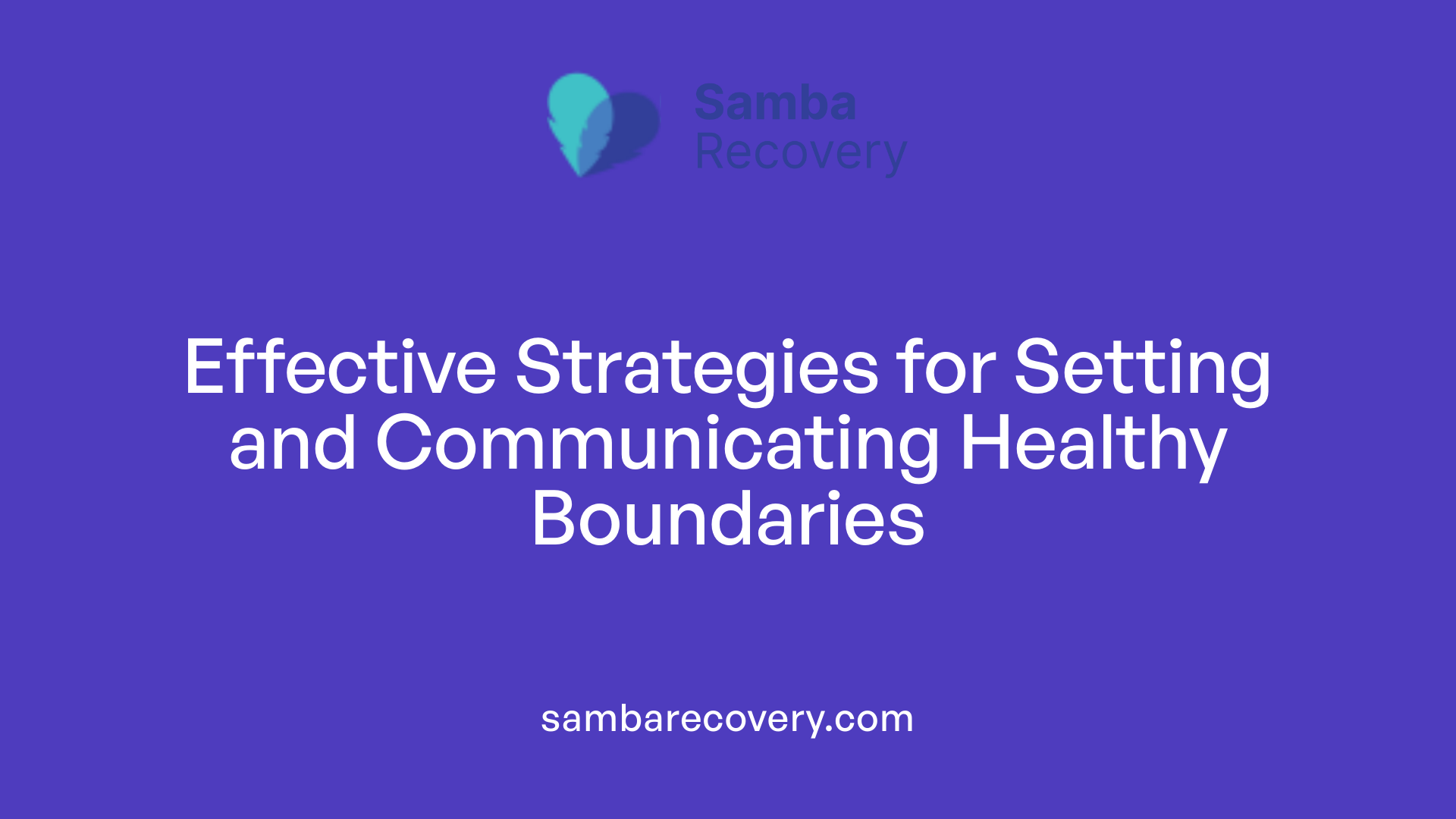
Self-reflection to identify needs and limits
The first step in establishing healthy boundaries is self-awareness. Individuals in recovery should take time to reflect on their personal values, emotional needs, and physical comfort levels. This process involves understanding what triggers may jeopardize sobriety and recognizing behaviors or situations that cause discomfort or stress. By identifying these needs and limits, one can create clear boundaries that protect their well-being.
Clear and honest communication using ‘I’ statements
Effective boundary-setting relies on open and respectful communication. Using ‘I’ statements allows individuals to express their boundaries without sounding accusatory or confrontational. For example, saying “I feel uncomfortable when…” or “I need…” helps communicate personal limits while fostering understanding. This approach encourages honest dialogue and minimizes defensiveness, making it more likely that boundaries will be respected.
Assertiveness and consistency in boundary enforcement
Being assertive means confidently and respectfully expressing one’s needs and standing firm on boundaries. Consistency is equally important; it reinforces the boundaries and demonstrates their importance. If boundaries are crossed, prompt and firm responses remind others of these limits. Practicing assertiveness in various situations builds self-trust, reduces anxiety about boundary violations, and supports ongoing recovery.
Seeking support from professionals and peer groups
Navigating boundary-setting can sometimes be challenging, especially when facing external pressures or guilt. Seeking guidance from therapists, support groups, or trusted peers can provide valuable encouragement and feedback. These resources offer strategies for effective communication, help process difficult emotions, and sustain boundary enforcement. Support networks also create a safe space to share experiences, fostering resilience and emotional strength.
Essential communication skills for setting and maintaining boundaries during recovery
Core skills include clearly expressing personal needs and limits using ‘I’ statements to foster honesty and respect. Assertiveness training helps individuals confidently communicate boundaries, say ‘no’ when necessary, and address violations assertively. Active listening facilitates mutual understanding and respect for others’ boundaries. Maintaining consistent, self-reflective communication reduces stress, helps prevent relapse triggers, and supports emotional stability. Additionally, professional support from therapists and peer groups enhances these efforts, reinforcing the importance of boundaries and resilience in recovery.
Implementing Boundaries Practically in Relationships
Establishing boundaries is essential for promoting recovery and protecting well-being in relationships affected by addiction. Practical implementation begins with setting clear and specific rules—such as prohibiting drugs and alcohol in the home or avoiding enabling behaviors like covering for the addicted loved one. These boundaries should be communicated openly and honestly, using 'I' statements to express feelings and needs without confrontation, fostering understanding.
Consistency is vital — enforcement involves following through with consequences if boundaries are crossed. Examples include staging interventions, limiting contact, or removing the person from the environment to maintain safety and clarity.
Professional support, such as therapists or support groups, can help in planning boundaries that are appropriate and sustainable. They provide strategies for addressing challenges and maintaining consistency.
Concrete examples of healthy boundaries include refusing to provide money that might enable substance use or setting emotional limits on conversations about addiction. Reinforcing boundaries with consequences, like re-evaluating contact or involving legal measures if necessary, supports accountability.
Self-care practices and support from others strengthen boundary enforcement, reducing stress and preventing relapse. Overall, implementing boundaries involves honest communication, firm enforcement, and ongoing collaboration with support networks to foster healthier relationships during recovery.
Overcoming Challenges in Boundary-Setting
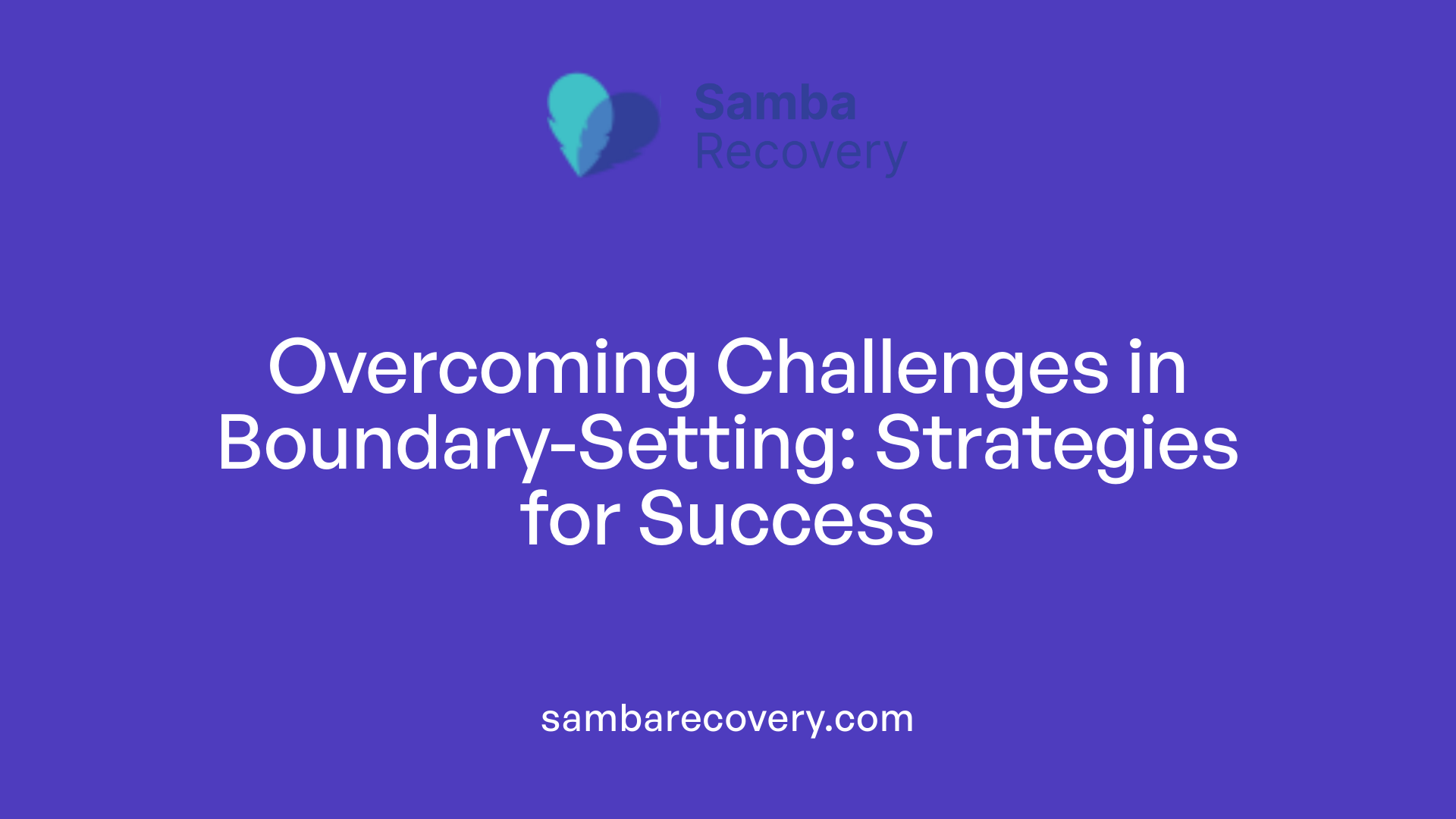
What challenges might arise when establishing boundaries during recovery, and how can they be addressed?
Setting boundaries during recovery can be difficult due to various emotional and environmental factors. One common issue is feelings of guilt, which might make individuals hesitant to assert their limits, fearing they might harm relationships or appear selfish.
Fear of rejection or conflict is another barrier. People may worry that saying no or enforcing limits could lead to confrontation, rejection, or emotional fallout. Additionally, difficulty in clearly communicating needs can result from lack of practice or fear of confrontation.
To overcome these challenges, it’s important to start with self-awareness—identify personal limits, values, and needs. Practicing assertive communication, using clear and respectful language, helps in conveying boundaries confidently. Reinforcing boundaries consistently gives others clear expectations, reducing confusion and enabling better respect.
Support from therapists, support groups, or trusted friends can provide encouragement and feedback. Learning that boundaries are acts of self-care rather than selfishness helps diminish feelings of guilt. Viewing boundary-setting as a protective measure for sobriety reinforces its importance.
Regularly reviewing boundaries allows adjustments to fit evolving recovery needs and relationships. Maintaining flexibility ensures boundaries serve their purpose without causing undue strain.
Ultimately, persistent support and self-compassion foster effective boundary-setting. Overcoming these challenges enhances emotional safety, promotes healthier relationships, and contributes to sustained recovery.
Rebuilding Trust and Relationships after Addiction
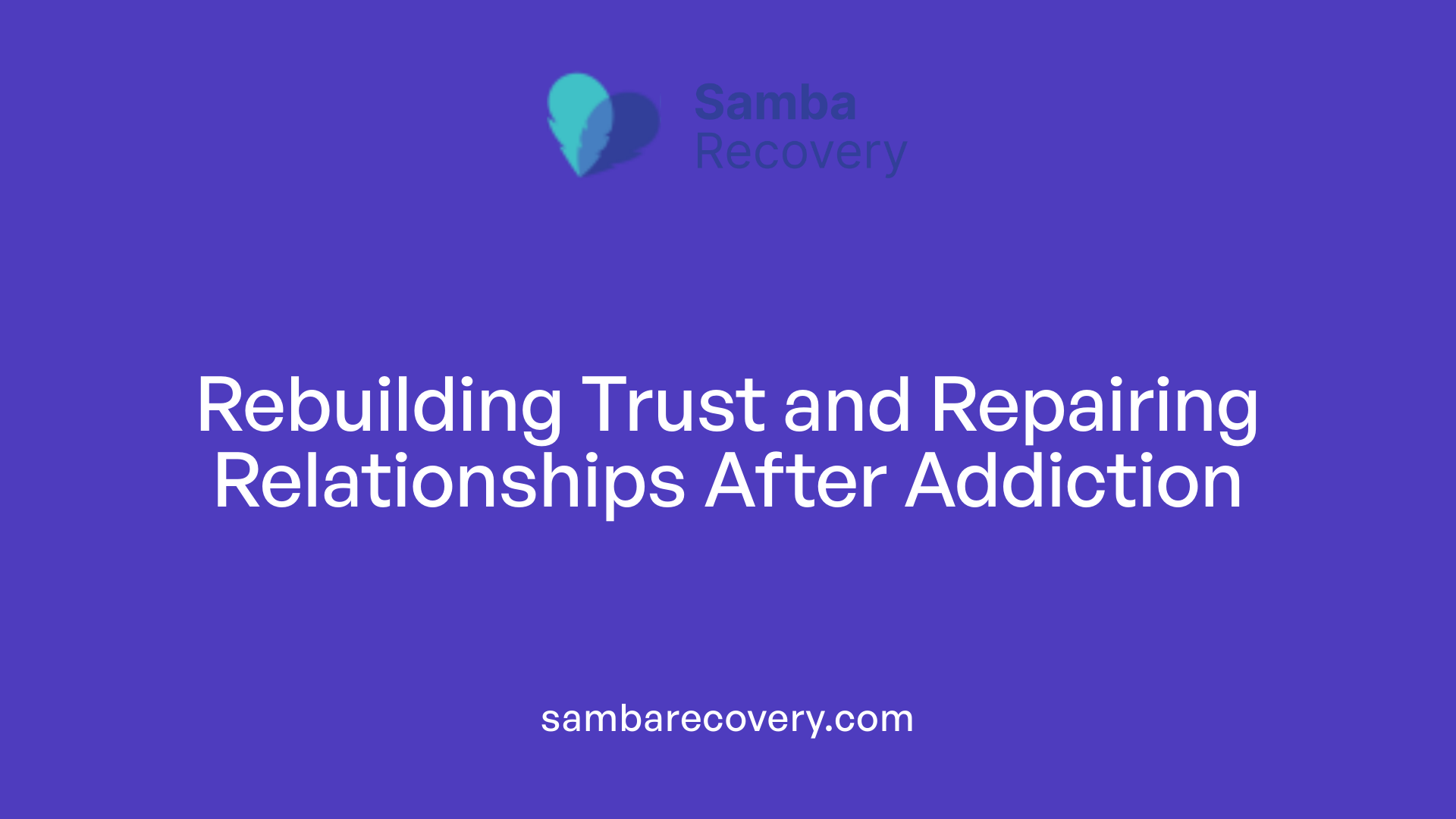
How can relationships be repaired after addiction?
Rebuilding trust after addiction is a delicate process that involves honest efforts from both the recovering individual and their loved ones. Central to this process are sincere apologies and making amends. Acknowledging past mistakes and demonstrating genuine remorse can pave the way for healing.
It is important to recognize that trust takes time to restore. Patience and consistency are vital as forgiveness and emotional intimacy gradually re-establish. Open dialogue about the recovery journey, coupled with active listening, helps surface underlying feelings and concerns, fostering understanding.
Healthy boundaries play a significant role in healing relationships. Setting clear personal limits ensures respect and emotional safety, reducing chances of relapse triggers or misunderstandings. Using professional therapy and family support can further address complex issues, improve communication skills, and facilitate mutual understanding.
In summary, repairing relationships after addiction requires ongoing effort, mutual commitment, and compassionate support. While some relationships may not fully recover, many can grow stronger through patience, honesty, and dedicated healing efforts.
The Continuous Nature of Boundary Maintenance and Support
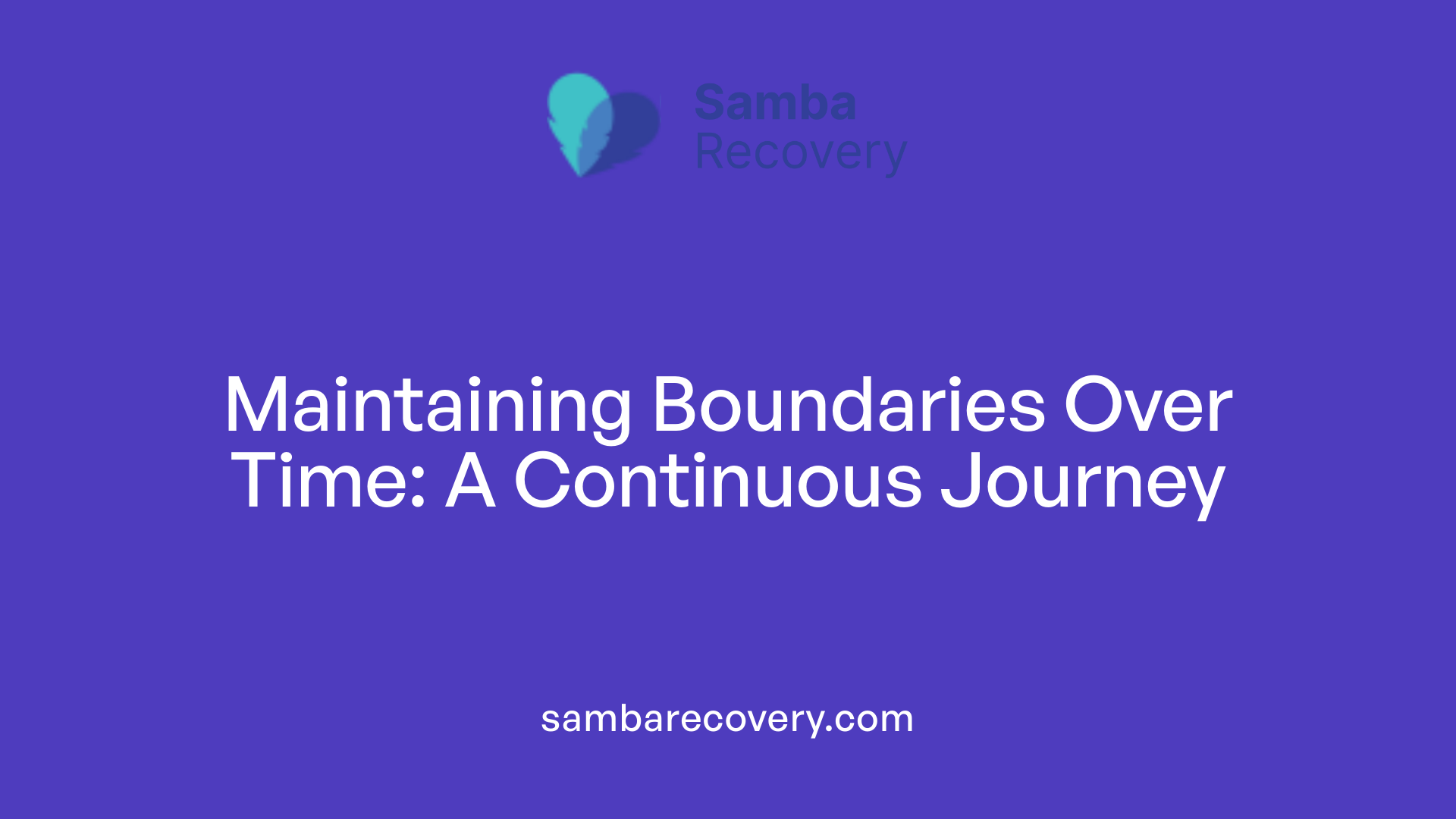
How can boundaries be maintained over time post-recovery?
Maintaining boundaries after recovery is an ongoing process that requires consistent effort and awareness. It begins with a strong commitment to enforce the limits you've set, resisting the temptation to relax your rules or ignore early warning signs of boundary violations.
Using clear communication strategies is essential. Saying 'no' firmly and respectfully, and articulating your needs directly, helps reinforce your boundaries. Seeking ongoing support from trusted friends, family members, or professionals such as therapists and support groups can provide additional reinforcement and accountability.
Consistency is vital; fluctuating in enforcing boundaries can send confusing messages and weaken their impact. To support emotional resilience, it's important to prioritize daily self-care activities. Regular exercise, adequate sleep, and proper nutrition bolster mental clarity and physical health, which are crucial for maintaining boundaries.
Furthermore, boundaries should be revisited regularly. Life circumstances, relationships, and personal growth can change, making it necessary to review and adjust your limits accordingly. Reflection and adaptation ensure your boundaries remain relevant and supportive of your recovery.
Support networks, including therapy and peer groups, play a vital role. These resources not only reinforce boundaries but also provide guidance and encouragement when challenges arise. Staying committed to boundary maintenance fosters a stable recovery environment, supporting long-term well-being and resilience.
Empowering Your Recovery Journey with Boundaries
Establishing and maintaining healthy boundaries is a vital part of the recovery process after addiction. Boundaries serve as personal safeguards that protect your emotional and physical well-being while fostering respectful, supportive relationships. From understanding different types of boundaries to practicing assertive communication, every step taken to reinforce these limits contributes to long-lasting recovery and personal growth. Remember, boundary setting is an ongoing process that requires patience, persistence, and support. By prioritizing self-care, seeking professional guidance, and staying true to your values, you can build a foundation of trust, respect, and resilience—empowering yourself to lead a sober, fulfilling life.
References
- Setting Boundaries with an Addict - Gateway Foundation
- What do healthy boundaries look like in recovery? - MHA Screening
- Boundaries in Addiction Recovery - Hazelden Betty Ford Foundation
- How To Set And Keep Boundaries With An Addict - Addiction Center
- Family Boundaries and Addiction
- How to Set Boundaries with Addicts - Andy Bhatti
- The Importance of Healthy Boundaries in Addiction Recovery
- Setting Healthy Boundaries In Addiction Recovery
- 4 Types of Boundaries in Recovery - Bradford Health Services
- The Role of Setting Boundaries in Addiction Recovery
About Samba Recovery
Start your treatment today!

Featured Articles
Read the latest addiction news and recovery tips from our blog.
Samba Recovery never miss an opportunity
Substance use may be part of your story, but it doesn’t have to be the rest of it. Sustainable recovery is possible and the best version of yourself is waiting at our Atlanta and Savannah, Georgia addiction recovery centers.
We’ll help you learn that the opposite of addiction is connection. We’ll give you skills to discover your self-worth and show you the tools for a life of hope and promise.
Contact us today!
We accept most major insurances
We partner with most major insurances, enabling you to access premier therapy services.










































































































